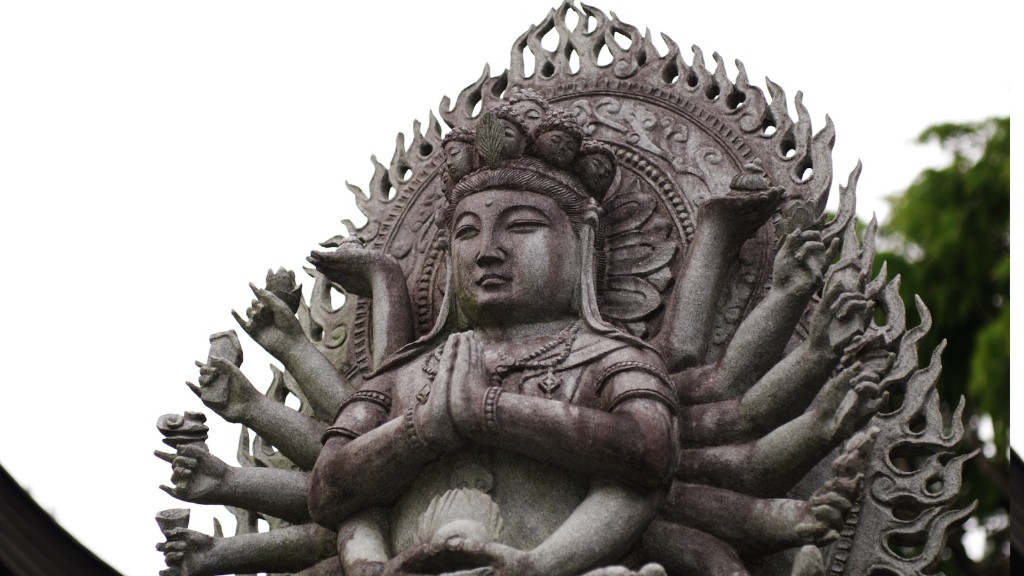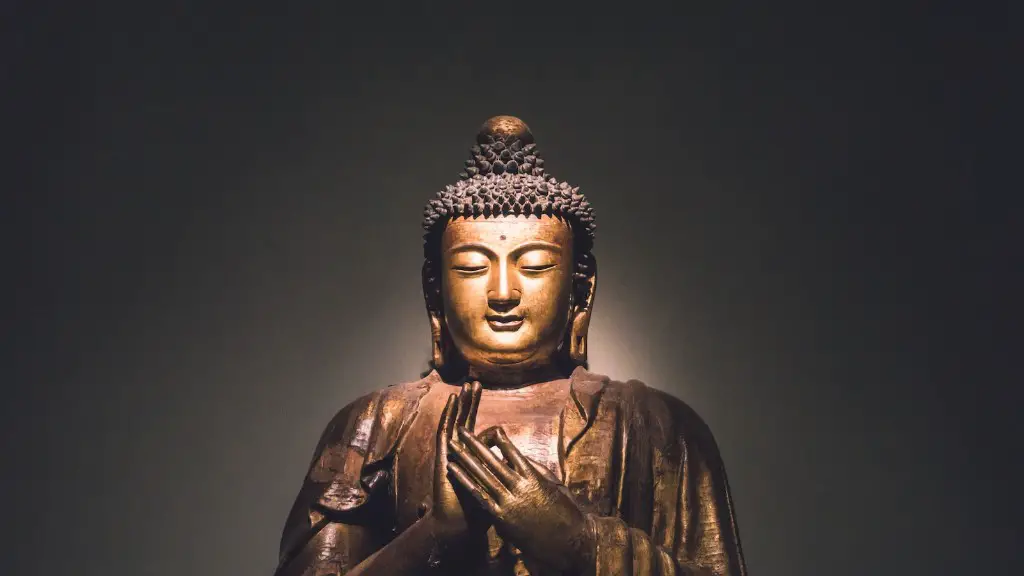In Buddhism, satori is a moment of sudden and profound understanding that opens up the mind to the true nature of reality. It is often described as a kind of awakening or enlightenment, and it is a key goal of Buddhist practice. Satori is not something that can be intellectually understood; it is an experience that must be lived.
Satori is a Japanese word which literally means “awakening.” In Buddhism, it refers to the experience of enlightenment or sudden enlightment. This can be experienced through meditation, study, and other religious practices.
What is a satori moment?
Satori is a moment of total presence, of no mind and no thought but a flash of insight and awakening of the light of our own consciousness. It’s a word used by Zen Masters to describe sudden enlightenment.
There is no single English word that accurately captures the Buddhist concepts of satori and kenshō, which are often translated as “enlightenment.” These terms refer to the experience of awakening to the true nature of reality and the fundamental truth of the Buddha’s teachings.
Enlightenment is a complex and multi-dimensional experience that can be difficult to put into words. In general, it is the realization that everything is interconnected and interdependent, that there is no separate self or ego, and that all beings are fundamentally equal. It is a state of complete peace, harmony, and bliss.
There are many different paths to enlightenment, and the experience of it can vary greatly from person to person. For some, it is a sudden and dramatic awakening, while for others it is a gradual process of understanding and realization. Kenshō is often described as a “moment of awakening,” while satori is a deeper and more lasting experience of enlightenment.
The Buddhist path is not about achieving enlightenment, but about the journey of personal transformation and growth. Enlightenment is the natural culmination of this journey, but it is not the goal. The goal is simply to live each day with greater awareness, compassion, and wisdom.
How do you practice satori
There is no single answer to the question of how to “attain” Satori, as the concept is highly personal and subjective. Some people may find that traditional methods such as working with Koans are helpful, while others may prefer a more personal approach. Ultimately, the only way to truly know what works for you is to explore and experiment until you find a path that resonates with you.
Satori is a Japanese word that can be translated as “enlightenment”, “awakening”, or “understanding”. It is often used to refer to the experience of sudden realization or insight that leads to a deep understanding of the nature of reality.
How long does satori last?
The Satori license lasts for two years. After that time, the materials must be relicensed or returned to Satori.
Satori Mountain is a mountain in Japan that is dedicated to Satoru Iwata, Nintendo’s then-CEO who passed away during the development of BOTW. The mountain is located in the Shikoku region of Japan and is a popular spot for hiking and camping.
Is satori a demon?
Satori are mind-reading demons (or yokai) from Japanese folklore. They are one of the innumerable animal-spirits, however they are somewhat greater in scale than most as they have roots with ancient monkey-worshipping cults native to many regions of the Far East prior to the advent of Buddhism and Taoism.
Satori is a Japanese word that means “enlightenment.” In Buddhism, enlightenment is the ultimate goal. Buddhists believe that through enlightenment, people can achieve nirvana, or perfect peace.
Satori is often used to refer to a person who has achieved enlightenment. In this context, it refers to someone who has gained a deep understanding of the true nature of reality.
Satori can also refer to a sudden realization or insight. This type of satori is often used in Zen Buddhism to describe the experience of enlightenment.
In the context of this article, satori refers to a woman who has the ability to read minds. This ability is known as telepathy. Telepathy is the ability to read another person’s thoughts without the use of normal senses.
Satori cannot control this ability, and it only works on those who are near her. This ability can be both a blessing and a curse. While it allows her to help others, it can also be very overwhelming.
What are the 4 stages of enlightenment in Buddhism
These four stages (Sotāpanna, Sakadāgāmi, Anāgāmi, and Arahant) correspond to the four levels of attainment in the Buddha’s teaching. A person who has attained the first stage, Sotāpanna, is said to have won release from the cycle of birth and death (samsara). Sakadāgāmi corresponds to a higher level of release, while Anāgāmi and Arahant correspond to the highest levels.
Satori is the sudden flashing into consciousness of a new truth hitherto undreamed of. To have a sudden flash of realization about something is a powerful experience. It can be life-changing, and it can certainly shift your perspective. To have satori is to be free from the limitations of your own mind, and to see the world in a new way.
What are the 6 perfections in Buddhism?
The six pillars of Buddhism are important aspects of the religion that help followers to live a moral and meaningful life. Generosity, morality, patience, vigor, concentration, and wisdom are all important virtues that help Buddhists to find inner peace and to lead a life that is in harmony with others.
A Buddhist temple is a place where people can go to pray and worship Buddha. There are many different ways to behave when visiting a Buddhist temple, but some basic rules include: doing the reverence at the entrance, avoiding the center line, doing the purifying ritual by cleansing up, ringing the bell if allowed, making a votive offering with candles or incense sticks, and praying toward the Main Hall. When exiting the temple, it is important to be respectful and not to disturb any of the offerings or rituals that are taking place.
What is satori enlightenment
Satori, also known as Chinese Wu, is the inner, intuitive experience of Enlightenment that is said to be unexplainable, indescribable, and unintelligible by reason and logic. It is comparable to the experience undergone by Gautama Buddha when he sat under the Bo tree and, as such, is the central Zen goal. Although it is difficult to put into words, those who have experienced Satori often describe it as a feeling of complete peace, joy, and understanding.
There is no definitive answer to this question as the concept of satori is largely subjective and personal. However, some common words that are often used to describe satori or similar experiences include enlightenment, epiphany, insight, revelation, inspiration, realization, oracle, vision, sign, and discovery.
What name means God’s light?
The name Elora is of Hebrew origin and means “my God is my light.” Elora is a beautiful name for a girl, and is also a popular name in the Elven culture. Whether you are looking for a unique name for your daughter or simply want a name with a beautiful meaning, Elora is a perfect choice.
Satori-Akuma’s Armored Samurai Spirit is a powerful ability that can be unleashed by pressing Q. When activated, a barrage of green projectiles is fired in the direction of the cursor, which explode upon impact. This ability uses 22,000 Chi and has a cooldown of 15 seconds.
Can you keep satori
It’s a shame that fans of the Legend of Zelda series cannot keep the Lord of the Mountain as their own personal pet. Not only is he incredibly fast, but he also has an unlimited supply of energy. His stats are off the charts and would make for one heck of a racehorse. Hopefully, someone out there can give him the home he deserves.
If you want to attempt to mount the Lord of the Mountain, you’ll need to first climb to the top of Satori Mountain. This is no easy feat, as the mountain is incredibly tall and treacherous. Once you reach the summit, you’ll need to wait for the mountain to glow green, signifying that the Lord of the Mountain is present. Once the mountain is glowing green, approach the beast and press A to mount it. If successful, you’ll be able to ride the Lord of the Mountain around Hyrule! Just be careful not to fall off, as the Lord of the Mountain is very slippery.
Conclusion
The term “satori” is derived from Japanese Buddhist tradition and typically refers to a sudden, awakening experience that opens up a previously hidden spiritual dimension of reality. In the Mahayana tradition, satori is often associated with the experience of Buddha-nature or emptiness (sunyata). In the Theravada tradition, it is often understood as a moment of profound insight into the nature of reality.
Satori is a sudden comprehension or understanding of the true nature of things. In Buddhism, it is the realization of the emptiness of all things and the Three Jewels of Buddhism: the Buddha, the Dharma, and the Sangha. Satori is often compared to a light being turned on in a dark room.



